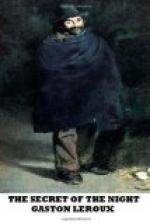“Tell me. I am listening.”
“But it is perfectly understood that once I have told you this you will give me my passport and allow me to depart?”
“You feel that you couldn’t possibly,” inquired Koupriane, more and more troubled, and after a moment of hesitation, “you couldn’t possibly tell me that and yet remain?”
“No, monsieur. From the moment you place me under the necessity of explaining each of my movements and each of my acts, I prefer to go and leave to you that ‘responsibility’ of which you spoke just now, my dear Monsieur Koupriane.”
Astonished and disquieted by this long conversation between Rouletabille and the Head of Police, Matrena Petrovna continually turned upon them her anguished glance, which always insensihly softened as it rested on Rouletabille. Koupriane read there all the hope that the brave woman had in the young reporter, and he read also in Rouletabille’s eye all the extraordinary confidence that the mere boy had in himself. As a last consideration had he not already something in hand in circumstances where all the police of the world had admitted themselves vanquished? Koupriane pressed Rouletabille’s hand and said just one word to him:
“Remain.”
Having saluted the general and Matrena affectionately, and a group of friends in one courteous sweep, he departed, with thoughtful brow.
During all this time the general, enchanted with the promenade, told stories of the Caucasus to his friends, believing himself young again and re-living his nights as sub-lieutenant at Tills. As to Natacha, no one had seen her. They retraced the way to the villa along deserted by-paths. Koupriane’s call made occasion for Athanase Georgevitch and Thaddeus, and the two officers also, to say that he was the only honest man in all the Russian police, and that Matrena Petrovna was a great woman to have dared rid herself of the entire clique of agents, who are often more revolutionary than the Nihilists themselves. Thus they arrived at the datcha.
The general inquired for Natacha, not understanding why she had left him thus during his first venture out. The schwitzar replied that the young mistress had returned to the house and had left again about a quarter of an hour later, taking the way that the party had gone on their promenade, and he had not seen her since.
Boris spoke up:
“She must have passed on the other side of the carriages while we were behind the trees, general, and not seeing us she has gone on her way, making the round of the island, over as far as the Barque.”
The explanation seemed the most plausible one.
“Has anyone else been here?” demanded Matrena, forcing her voice to be calm. Rouletabille saw her hand tremble on the handle of the rolling-chair, which she had not quitted for a second during all the promenade, refusing aid from the officers, the friends, and even from Rouletabille.




